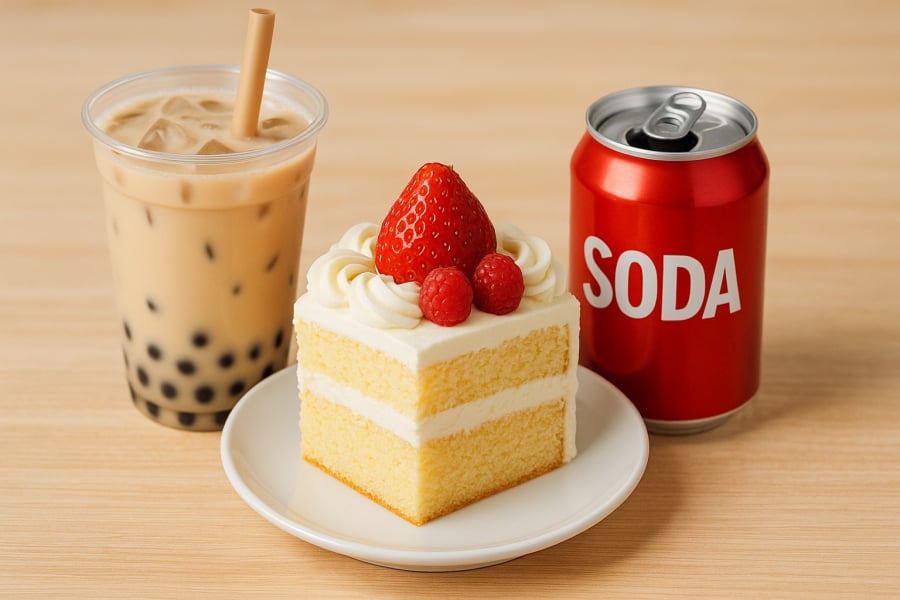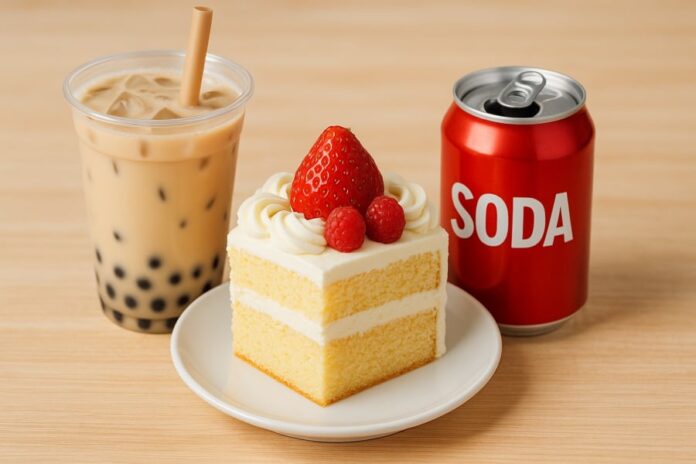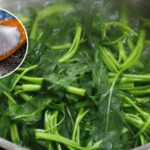The Sweet Trap: Feeding the Cancer Cells
A cup of boba tea, a slice of cake, or even a bowl of pho with a sugary broth… These treats satisfy our taste buds, but little do we know that sugar—especially refined sugar—is the preferred fuel for cancer cells.
According to Dr. Tran Van Phuc (Xanh Pon General Hospital) in an article on VnExpress, cancer cells have the ability to “consume sugar” up to 10-12 times more than normal cells. “Therefore, a diet high in sugar can cause tumors to grow faster,” he says.
Additionally, when the body consumes too much sugar, the pancreas has to work continuously to produce insulin—a growth-stimulating hormone that creates favorable conditions for abnormal cell growth. That’s why people with type 2 diabetes have a higher risk of cancer.

The Savory Seduction: Grease May Taste Good, but It’s Harming Your Body
The sensation of rich, fatty foods can make dishes more appealing—from fried chicken and fried spring rolls to french fries and cheese cakes. But according to Associate Professor Dr. Nguyen Duy Thinh (Institute of Biotechnology and Food Technology, Hanoi University of Science and Technology), trans fat in fried foods at high temperatures is a “culprit” in promoting breast, colorectal, and liver cancers.
Sharing on ZingNews, he said: “When oil is reused for frying multiple times, the fat molecules change and produce oxidizing agents that cause gene mutations—the root of cancer.”
In addition, saturated fat in red meat and processed foods can cause chronic inflammation—one of the foundational factors leading to cancer. The more fried and salty foods you eat, the higher the risk, especially for young people who have a habit of eating fast food and drinking sugary beverages.

The Silent Killer in Your Diet: Salt
Fish sauce, pickled vegetables, bacon, sausages… These familiar foods contain salt levels far beyond recommended guidelines. Many people mistakenly believe that only hypertension is related to salt intake, but in fact, stomach cancer is a more serious potential consequence.
According to Vietnamnet, the World Health Organization (WHO) warns that there are more than 1 million new cases of stomach cancer each year, and salt and salted foods are a significant risk factor. Salt damages the stomach lining, creating favorable conditions for the development of Helicobacter pylori bacteria—the main cause of stomach cancer.
Vietnam is one of the countries with salt consumption twice the recommended level. A 2023 survey by the National Institute of Nutrition showed that the average Vietnamese person consumes up to 9.4g of salt per day—nearly double the safe limit of 5g.
Indulging Your Taste Buds or Prioritizing Your Health?
We live in an age where the tastier the food, the more dangerous it tends to be. Sweet, savory, and salty flavors not only enhance our meals but also silently erode our health over time.
Ms. Hoang Thi Mai (38 years old, Hanoi) used to drink boba tea almost every day, ate fried foods late at night, and always seasoned her food with extra salt. After discovering precancerous polyps in her stomach, she shared: “I never thought that my daily eating habits could be so harmful. Now, when I see fried doughnuts, I feel afraid.”
While dietary choices are a personal matter, understanding the “nature” of these flavors can help us balance our menus and adopt a preventative lifestyle instead of waiting for treatment.
Expert Advice
- Gradually reduce sugar intake and replace it with fresh fruit. Avoid sugary drinks.
- Prioritize steamed and boiled foods. Limit frying or use vegetable oil for single-use only.
- Reduce salt intake from sauces, pickles, and packaged foods. Estimating the salt content in seasonings is a necessary habit.
“Diet accounts for 30-40% of the risk factors for cancer. Changing our eating habits is the simplest but most effective way to prevent cancer,” said Dr. Truong Hong Son, Director of the Vietnam Institute of Applied Medicine, in an article on Dan Tri.
Eat These 3 Red Foods at the Start of Summer to Stay Healthy All Year Long
“Summer is a time to embrace the vibrant and vibrant colors of nature’s bounty, and one ancient adage advises us to ‘eat three red foods at the start of summer to stay healthy all year.’ This intriguing piece of advice begs the question: what are these three red foods, and why are they so powerful? Unraveling this mystery could offer a fascinating insight into the intersection of culture, health, and the natural world.”
3 Foods That Cause Hair Loss: The First One May Surprise You
Hair loss is a common concern for many, but did you know that your diet could be a contributing factor? It’s true – what you eat can have a significant impact on the health and vitality of your locks. In fact, there are three common foods that, if not consumed in moderation, could lead to excessive hair shedding.
Why Does Adding Salt to Boiling Vegetables Keep Them Green and Bright?
Introducing the secret to vibrant, healthy-looking boiled vegetables: a pinch of salt. It’s a widely adopted trick to add salt to the boiling water, resulting in greener, more vibrant veggies. But the question remains: why does salt have this magical effect? Unraveling this mystery is key to unlocking the full potential of your culinary creations.








































